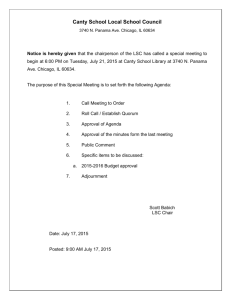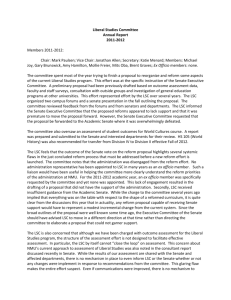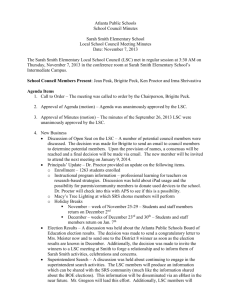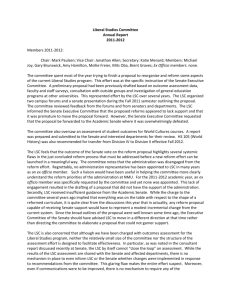7-18-01 alert
advertisement
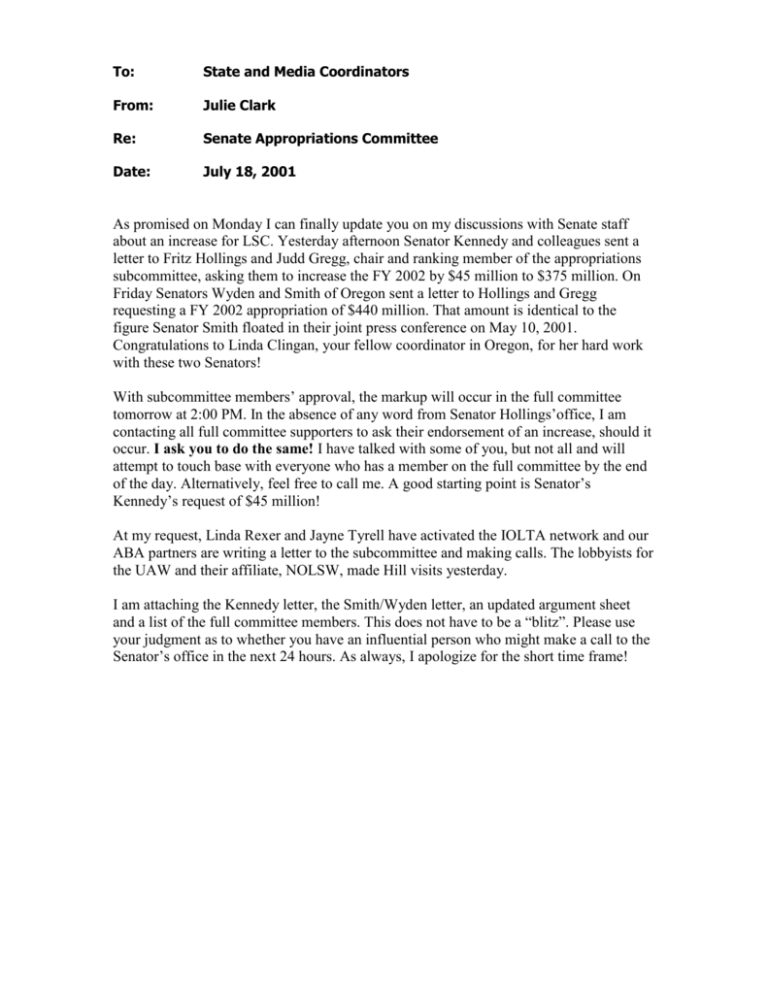
To: State and Media Coordinators From: Julie Clark Re: Senate Appropriations Committee Date: July 18, 2001 As promised on Monday I can finally update you on my discussions with Senate staff about an increase for LSC. Yesterday afternoon Senator Kennedy and colleagues sent a letter to Fritz Hollings and Judd Gregg, chair and ranking member of the appropriations subcommittee, asking them to increase the FY 2002 by $45 million to $375 million. On Friday Senators Wyden and Smith of Oregon sent a letter to Hollings and Gregg requesting a FY 2002 appropriation of $440 million. That amount is identical to the figure Senator Smith floated in their joint press conference on May 10, 2001. Congratulations to Linda Clingan, your fellow coordinator in Oregon, for her hard work with these two Senators! With subcommittee members’ approval, the markup will occur in the full committee tomorrow at 2:00 PM. In the absence of any word from Senator Hollings’office, I am contacting all full committee supporters to ask their endorsement of an increase, should it occur. I ask you to do the same! I have talked with some of you, but not all and will attempt to touch base with everyone who has a member on the full committee by the end of the day. Alternatively, feel free to call me. A good starting point is Senator’s Kennedy’s request of $45 million! At my request, Linda Rexer and Jayne Tyrell have activated the IOLTA network and our ABA partners are writing a letter to the subcommittee and making calls. The lobbyists for the UAW and their affiliate, NOLSW, made Hill visits yesterday. I am attaching the Kennedy letter, the Smith/Wyden letter, an updated argument sheet and a list of the full committee members. This does not have to be a “blitz”. Please use your judgment as to whether you have an influential person who might make a call to the Senator’s office in the next 24 hours. As always, I apologize for the short time frame! United States Senate WASHINGTON, DC 20510 July 17, 2001 The Honorable Ernest F. Hollings The Honorable Judd Gregg Chair and Ranking Member Subcommittee on Commerce, Justice, State, and the Judiciary Committee on Appropriations Washington, DC 20510 Dear Fritz and Judd: We are writing to request an increase of $45 million in funding for the Legal Services Corporation in the Fiscal Year 2002 Commerce, Justice, State and the Judiciary and Related Agencies Appropriations bill, in order to provide greater legal representation to those in our society who need it most. The Legal Services Corporation has unfairly suffered a 17.5% reduction in federal funding since 1995, at a time when legal services are more in demand than ever. Congress reduced the funding to $278 million for FY 1996 from $400 million for FY 1995, and although the level has now risen back to $330 million for FY 2001, it is still far from adequate to guarantee that the rights provided by the Constitution are not an empty promise for those unable to afford an attorney. In fact, restoring funding to the 1995 level would require an appropriation of $475 million for FY 2002, when adjusted for inflation. Many states are struggling to make efforts of their own to deal with this serious challenge. Funds provided by the Legal Services Corporation are indispensable to these efforts, especially since constraints on resources continue to force local legal services providers to deny applications from people in need. Clearly, large numbers of Americans do not have the legal representation they deserve. We urge you to increase funding for the Legal Services Corporation by $45 million to help meet this urgent need. Sincerely, Jeff Bingaman Maria Cantwell Hillary R. Clinton Richard J. Durbin Edward M. Kennedy Jack Reed Paul Wellstone United States Senate WASHINGTON, DC 20510 July 13, 2001 The Honorable Judd Gregg, Ranking Member Subcommittee on Commerce, Justice, State and the Judiciary Senate Appropriations Committee 268 Russell Senate Building Washington, DC 20510 Dear Senator Gregg: We commend you on your long history of leadership in supporting the mission and work of the Legal Services Corporation (LSC). As you know, the LSC has been providing federal grants to local legal services programs serving every county in the nation for over 25 years. This program serves as the foundation for our national system of civil legal assistance; without the LSC, millions of low income Americans would be denied critical legal help. In addition, the LSC has fulfilled its commitment to Congress by ensuring that the program abide by the restrictions adopted in 1996. The LSC has become an institution of which all members of Congress can be proud – one that reinforces America’s core principles such as the rule of law, and one that provides a real mechanism for low income individuals to access the courts. Too many in our nation still lack real access to our justice system. A recent study of the legal needs of low income residents of our state showed that Oregonians were able to obtain legal assistance in only 18 percent of the instances in which they were needed. Due to cuts made in 1996, people living in many (largely rural) areas of the state and the country have no access to legal services. A significant increase in funding would help the LSC fulfill the mandate bestowed upon it by Congress when it was established. Providing a minimum of $440 million for the LSC in FY 2002 will ensure that our nation continues to set the standard for justice worldwide. Thank you very much for your leadership and consideration of our views. Sincerely, Gordon H. Smith Ron Wyden SENATE APPROPRIATION FOR LSC The Senate Appropriations Subcommittee should include an increase in funding for the Legal Service Corporation (LSC) in the FY 2002 State, Justice, Commerce, the Judiciary and Related Agencies appropriations bill. An increase would begin to bring the funding of LSC grantees back to the level that was reached in 1995. In FY 1996, the 104th Congress drastically cut the funds appropriated to the Legal Services Corporation. The 30% reduction reduced the agency’s funding from $400 million to $278 million. Today, it would take an appropriation of approximately $475 million to restore the level of funding provided in FY 95 if the figure were adjusted for inflation. Since the 1995 cut, LSC grantees have faced significant new challenges. Client needs have increased as more people under the poverty line have entered the workforce. The client community includes a growing number of cultural and linguistic minority communities in many areas of the country ill-equipped to address the special needs of these populations. Programs have found it even harder to serve large rural areas in light of the significant decrease in federal support. The equal justice community has exhibited tremendous resiliency in meeting these challenges: Legal services providers have adapted new technologies and delivery innovations to expand their capacity to serve diverse client communities. Significant efforts have been made in many states to expand the base of financial support for legal services beyond LSC funding. Nothing, however, can make up for the fact that a crisis in financial resources exists in much of the United States to meet even the minimal civil legal needs of low income families. The promise of equal justice indeed continues to ring hollow for those who cannot be served. A fundamental commitment of adequate resources at the federal level is the critical building block upon which any additional funding is based. That support is particularly critical on the Indian reservation, in the Deep South, and in rural communities around the country. The cuts sustained by LSC over the past five years had little to do with budget concerns. The cuts were the result of actions by an extremely hostile group of critics and legislative leaders intent on eliminating the program entirely. The reduction extracted an inordinate proportion of the LSC budget when compared with most other social programs. Despite these attacks, LSC has continued to enjoy the support of a strong bi-partisan majority in both Houses of Congress. For the first time since 1995, the FY 2002 House appropriations bill does not include a cut in funding for legal services and the Bush Administration has asked the Congress to continue funding LSC at its current level. Since 1997, the bipartisan majority in the Senate has led the Congress in affirming its support for LSC and opposing additional cuts in funding. It is once again time for the Senate to affirmatively show its support for the program by providing an increase in funding for FY 2002. SENATE COMMITTEE ON APPROPRIATIONS FULL COMMITTEE Democrats (15) Republicans (14) Robert C. Byrd, W.Va. - chairman Daniel K. Inouye, Hawaii Ernest F. Hollings, S.C. Patrick J. Leahy, Vt. Tom Harkin, Iowa Barbara A. Mikulski, Md. Harry Reid, Nev. Herb Kohl, Wis. Patty Murray, Wash. Byron L. Dorgan, N.D. Dianne Feinstein, Calif. Richard J. Durbin, Ill. Tim Johnson, S.D. Mary L. Landrieu, La. Jack Reed, R.I. Ted Stevens, Alaska - ranking member Thad Cochran, Miss. Arlen Specter, Pa. Pete V. Domenici, N.M. Christopher S. Bond, Mo. Mitch McConnell, Ky. Conrad Burns, Mont. Richard C. Shelby, Ala. Judd Gregg, N.H. Robert F. Bennett, Utah Ben Nighthorse Campbell, Colo. Larry E. Craig, Idaho Kay Bailey Hutchison, Texas Mike DeWine, Ohio

